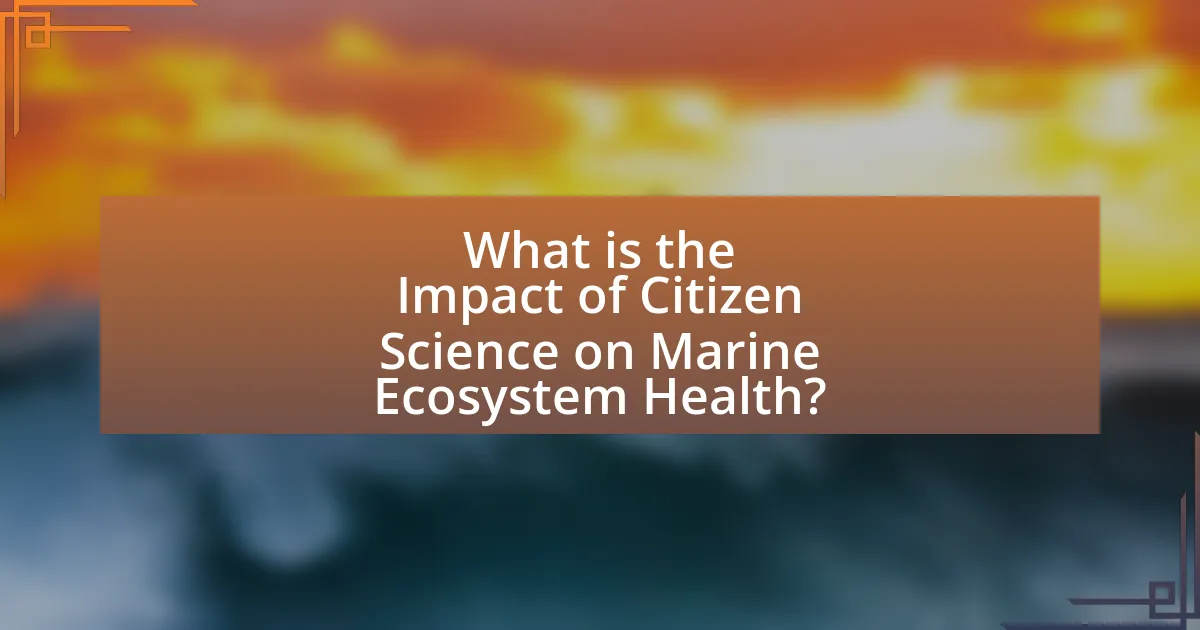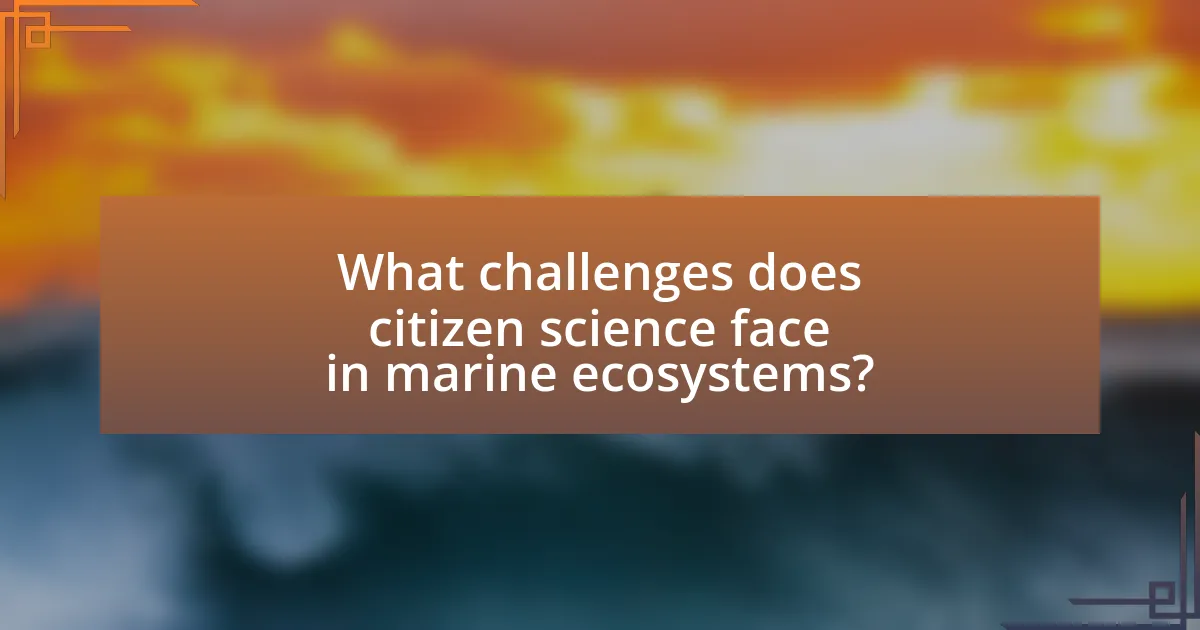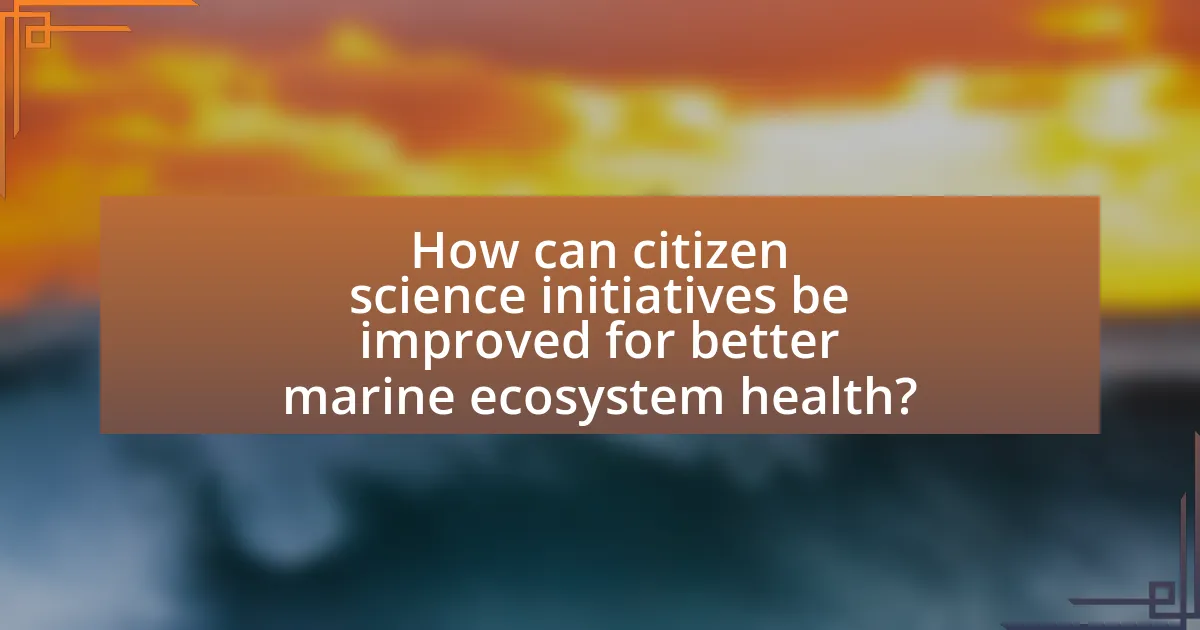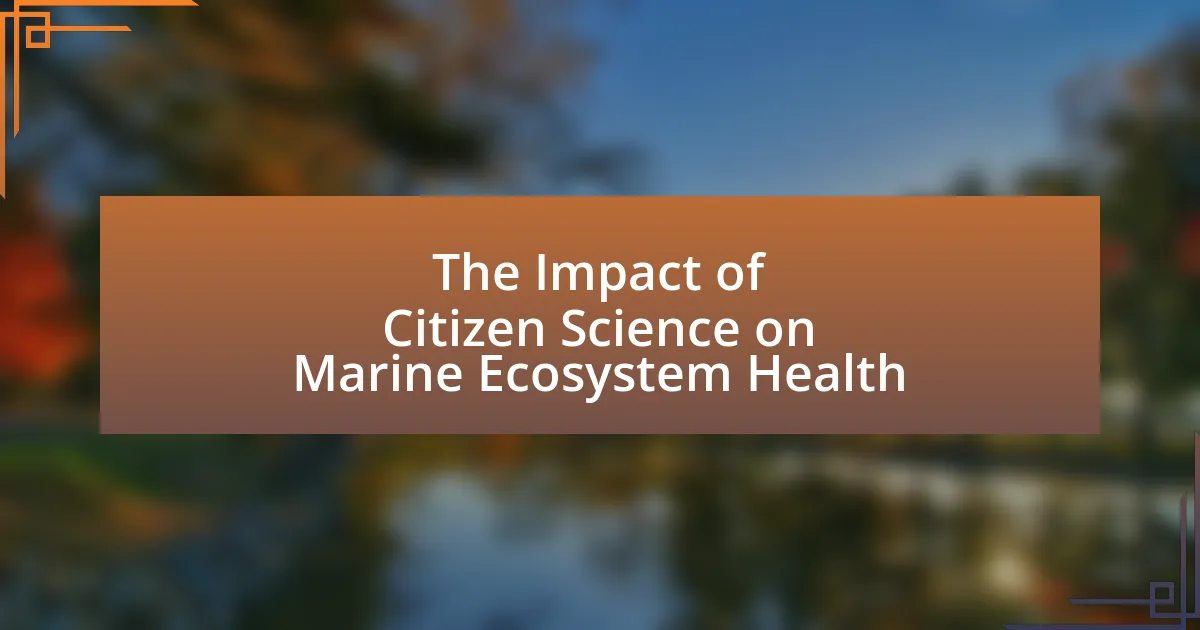Citizen science plays a crucial role in enhancing marine ecosystem health by facilitating data collection and fostering public engagement in conservation efforts. Initiatives such as the Ocean Conservancy’s International Coastal Cleanup mobilize volunteers to gather vital information on marine debris, which informs policy changes and conservation strategies. The article explores how citizen science contributes to biodiversity monitoring, the methods used for data collection, and the benefits of community involvement in marine assessments. It also addresses challenges related to data quality and participant engagement, while highlighting best practices and strategies for improving citizen science initiatives to support marine ecosystem health.

What is the Impact of Citizen Science on Marine Ecosystem Health?
Citizen science significantly enhances marine ecosystem health by increasing data collection and public engagement in conservation efforts. Through initiatives like the Ocean Conservancy’s International Coastal Cleanup, volunteers gather critical data on marine debris, which informs policy changes and conservation strategies. Studies show that citizen science projects can lead to improved biodiversity monitoring, as seen in the Global Coral Reef Monitoring Network, where local volunteers contribute to reef health assessments. This collaborative approach not only raises awareness but also fosters community stewardship, ultimately leading to more effective marine management practices.
How does citizen science contribute to marine ecosystem monitoring?
Citizen science significantly contributes to marine ecosystem monitoring by engaging the public in data collection and observation, which enhances the volume and diversity of data available for scientific analysis. This approach allows researchers to gather extensive information on marine species, water quality, and habitat conditions across vast geographic areas, often at a lower cost than traditional methods. For instance, projects like the Ocean Conservancy’s International Coastal Cleanup mobilize thousands of volunteers annually to collect data on marine debris, providing critical insights into pollution trends and their impacts on marine life. Such contributions not only bolster scientific research but also foster community awareness and stewardship of marine environments.
What methods are used in citizen science for marine data collection?
Citizen science for marine data collection employs methods such as visual surveys, water sampling, and species identification. Visual surveys involve volunteers observing and recording marine life, which helps in assessing biodiversity and population trends. Water sampling allows citizen scientists to collect data on water quality parameters, such as temperature, salinity, and nutrient levels, which are crucial for understanding ecosystem health. Species identification often utilizes mobile applications and online platforms, enabling participants to document and share findings, contributing to databases that inform conservation efforts. These methods collectively enhance data availability and support marine research initiatives.
How do volunteers participate in marine ecosystem assessments?
Volunteers participate in marine ecosystem assessments by collecting data on species diversity, water quality, and habitat conditions. These assessments often involve structured protocols where volunteers conduct surveys, monitor changes in marine life, and report findings to researchers. For instance, programs like the Marine Conservation Society’s “Beachwatch” engage volunteers in beach clean-ups and data collection on litter, which contributes to understanding pollution impacts on marine ecosystems. This citizen science approach enhances data collection efforts, as evidenced by studies showing that volunteer-collected data can be as reliable as that gathered by professionals, thereby significantly contributing to marine conservation efforts.
What are the key benefits of citizen science for marine ecosystems?
Citizen science significantly enhances marine ecosystems by increasing data collection, fostering community engagement, and promoting conservation efforts. Through citizen participation, large-scale data on species distribution, water quality, and habitat conditions can be gathered, which is crucial for effective management and policy-making. For instance, projects like the Ocean Conservancy’s International Coastal Cleanup have mobilized thousands of volunteers, resulting in the removal of millions of pounds of trash from coastlines, directly benefiting marine life. Additionally, citizen science initiatives often raise awareness about marine issues, leading to stronger community support for conservation measures, as evidenced by the increased local advocacy following participation in such projects.
How does citizen science enhance public awareness of marine issues?
Citizen science enhances public awareness of marine issues by actively involving individuals in data collection and research, fostering a deeper understanding of marine ecosystems. This engagement allows participants to observe and report on local marine conditions, which increases their knowledge about environmental challenges such as pollution, climate change, and biodiversity loss. Studies, such as those conducted by the National Oceanic and Atmospheric Administration, demonstrate that citizen science projects lead to heightened public interest and concern for marine conservation, as participants often share their experiences and findings within their communities, amplifying awareness and advocacy efforts.
What role does citizen science play in biodiversity conservation?
Citizen science plays a crucial role in biodiversity conservation by engaging the public in data collection and monitoring efforts, which enhances scientific research and conservation outcomes. This participatory approach allows for the gathering of large-scale data on species distribution, population trends, and habitat conditions, often surpassing what professional scientists could achieve alone. For instance, projects like the Audubon Society’s Christmas Bird Count have documented changes in bird populations over decades, providing valuable insights into biodiversity shifts and informing conservation strategies. Additionally, citizen science initiatives can raise awareness and foster community involvement in conservation efforts, leading to more effective stewardship of natural resources.

What challenges does citizen science face in marine ecosystems?
Citizen science in marine ecosystems faces challenges such as data quality, participant engagement, and resource limitations. Data quality issues arise from variability in participant expertise and the potential for misidentification of species, which can lead to inaccurate datasets. Engagement of volunteers can fluctuate, impacting the consistency and reliability of data collection over time. Additionally, resource limitations, including funding and access to technology, hinder the ability to train participants effectively and maintain ongoing projects. These challenges can undermine the overall effectiveness of citizen science initiatives in contributing to marine ecosystem health.
How do data quality and reliability issues affect citizen science?
Data quality and reliability issues significantly undermine the effectiveness of citizen science by compromising the accuracy and validity of the data collected. When citizen scientists provide data that is inaccurate or unreliable, it can lead to erroneous conclusions about marine ecosystem health, ultimately affecting conservation efforts and policy decisions. For instance, a study published in the journal “Frontiers in Ecology and the Environment” by Daniel J. McGowan et al. (2019) highlights that poor data quality can result in misinformed management strategies, which may exacerbate the decline of marine species. Thus, ensuring high data quality and reliability is crucial for the success of citizen science initiatives aimed at monitoring and preserving marine ecosystems.
What measures can be taken to ensure data accuracy in citizen science?
To ensure data accuracy in citizen science, implementing standardized protocols for data collection is essential. These protocols guide participants on how to gather and report data consistently, reducing variability and errors. Training sessions for citizen scientists can further enhance accuracy by educating them on best practices and the importance of precise measurements. Additionally, employing technology such as mobile apps with built-in validation checks can help verify data in real-time, ensuring that submissions meet quality standards. Research indicates that projects utilizing these measures, like the Marine Biodiversity Observation Network, have significantly improved data reliability, demonstrating the effectiveness of structured approaches in citizen science initiatives.
How do varying levels of volunteer expertise impact research outcomes?
Varying levels of volunteer expertise significantly impact research outcomes by influencing data quality, project efficiency, and overall findings. Research indicates that volunteers with higher expertise contribute more accurate and reliable data, which enhances the validity of research conclusions. For instance, a study published in the journal “Citizen Science: Theory and Practice” by Bonney et al. (2014) demonstrated that expert volunteers were able to identify species with greater precision compared to novices, leading to more robust ecological assessments. Additionally, projects that leverage the skills of experienced volunteers often achieve faster results and more comprehensive datasets, ultimately improving the effectiveness of citizen science initiatives in marine ecosystem health.
What are the legal and ethical considerations in citizen science?
Legal and ethical considerations in citizen science include issues of data ownership, informed consent, and the potential for harm to participants or ecosystems. Data ownership is crucial as contributors may expect recognition or compensation for their contributions, which raises questions about intellectual property rights. Informed consent is essential to ensure that participants understand the risks and benefits of their involvement, particularly in studies that may impact marine ecosystems. Additionally, ethical guidelines must be established to prevent harm to both participants and the environment, as improper data collection or analysis could lead to negative consequences for marine health. These considerations are supported by frameworks such as the Belmont Report, which emphasizes respect for persons, beneficence, and justice in research involving human subjects.
How can citizen scientists ensure compliance with environmental regulations?
Citizen scientists can ensure compliance with environmental regulations by adhering to established guidelines and protocols while conducting their research. This includes familiarizing themselves with local, state, and federal environmental laws relevant to their activities, such as the Clean Water Act or the Endangered Species Act. By following these regulations, citizen scientists contribute to the protection of marine ecosystems and ensure that their data collection methods do not harm the environment. Additionally, they can collaborate with regulatory agencies and professional scientists to align their efforts with compliance standards, thereby enhancing the credibility and impact of their findings.
What ethical guidelines should be followed in marine citizen science projects?
Ethical guidelines in marine citizen science projects include obtaining informed consent from participants, ensuring data privacy, and promoting environmental stewardship. Informed consent is crucial as it ensures that participants understand the purpose and potential impacts of their involvement. Data privacy must be maintained to protect sensitive information about participants and the ecosystems being studied. Promoting environmental stewardship encourages participants to engage responsibly with marine environments, fostering a culture of conservation. These guidelines are supported by the principles outlined in the “Citizen Science Association’s Code of Conduct,” which emphasizes ethical engagement and responsible data management in citizen science initiatives.

How can citizen science initiatives be improved for better marine ecosystem health?
Citizen science initiatives can be improved for better marine ecosystem health by enhancing data quality through standardized protocols and training for participants. Implementing clear guidelines ensures that data collected is reliable and comparable across different projects. Research indicates that citizen science projects with structured training programs yield higher quality data, as seen in the study by Bonney et al. (2014) published in “Frontiers in Ecology and the Environment,” which emphasizes the importance of participant education in achieving scientific rigor. Additionally, fostering collaboration between scientists and local communities can increase engagement and ensure that the data collected addresses relevant local issues, thereby improving the overall impact on marine ecosystem health.
What strategies can enhance volunteer engagement in citizen science?
To enhance volunteer engagement in citizen science, organizations should implement strategies such as providing clear communication, offering training, and fostering a sense of community. Clear communication ensures that volunteers understand their roles and the impact of their contributions, which can increase motivation. Training equips volunteers with the necessary skills and knowledge, making them feel more competent and valued. Fostering a sense of community through social events or online forums encourages collaboration and strengthens relationships among volunteers, leading to higher retention rates. Research indicates that engaged volunteers are more likely to participate in ongoing projects, thereby positively influencing marine ecosystem health through sustained citizen science efforts.
How can technology be leveraged to improve citizen science participation?
Technology can be leveraged to improve citizen science participation by utilizing mobile applications, online platforms, and data collection tools that facilitate user engagement and streamline the research process. For instance, mobile apps like iNaturalist allow users to easily document and share observations of marine species, contributing valuable data to scientific research. Additionally, online platforms such as Zooniverse enable participants to engage in various projects, providing a user-friendly interface that encourages collaboration and data analysis. Research indicates that these technological tools enhance accessibility and motivation, leading to increased participation rates in citizen science initiatives, as evidenced by a study published in the journal “Citizen Science: Theory and Practice,” which found that 70% of participants reported higher engagement due to the ease of use of digital tools.
What training resources are available for citizen scientists?
Training resources available for citizen scientists include online courses, workshops, and field training programs. Organizations such as the Citizen Science Association provide comprehensive training materials and webinars that cover various aspects of citizen science, including data collection and project management. Additionally, platforms like Coursera and edX offer courses specifically focused on environmental science and citizen engagement, which enhance the skills necessary for effective participation in marine ecosystem health projects. These resources are designed to equip citizen scientists with the knowledge and tools needed to contribute meaningfully to research and conservation efforts.
What best practices should be adopted for successful citizen science projects?
Successful citizen science projects should adopt clear communication, robust training, and effective data management practices. Clear communication ensures that participants understand project goals and their roles, which enhances engagement and data quality. Robust training equips volunteers with the necessary skills to collect and analyze data accurately, as evidenced by studies showing that well-trained participants produce more reliable results. Effective data management involves using standardized protocols and tools for data collection and analysis, which facilitates data sharing and integration into larger scientific frameworks. These practices collectively enhance the credibility and impact of citizen science initiatives on marine ecosystem health.
How can collaboration with scientific institutions benefit citizen science?
Collaboration with scientific institutions can significantly enhance citizen science by providing access to expert knowledge, resources, and data validation. This partnership allows citizen scientists to engage in more rigorous research methodologies, improving the quality and credibility of their findings. For instance, studies have shown that when citizen science projects are supported by academic institutions, the data collected often meets higher scientific standards, leading to more impactful contributions to marine ecosystem health assessments. A notable example is the partnership between the Ocean Conservancy and local volunteers, which resulted in comprehensive data on marine debris, influencing policy changes and conservation efforts.
What are the key elements of effective communication in citizen science initiatives?
The key elements of effective communication in citizen science initiatives include clarity, engagement, feedback, and accessibility. Clarity ensures that the objectives and methods of the initiative are easily understood by participants, which is crucial for accurate data collection. Engagement involves actively involving citizens through interactive platforms and community events, fostering a sense of ownership and responsibility towards the project. Feedback is essential for maintaining participant motivation and improving the initiative; providing updates on findings and acknowledging contributions reinforces the value of citizen input. Accessibility ensures that information is available in various formats and languages, making it inclusive for diverse audiences. These elements collectively enhance participation and data quality, as evidenced by studies showing that well-communicated initiatives lead to higher volunteer retention and more reliable data outcomes.
What practical steps can individuals take to contribute to marine ecosystem health through citizen science?
Individuals can contribute to marine ecosystem health through citizen science by participating in data collection and monitoring programs. Engaging in activities such as beach cleanups, water quality testing, and species identification helps gather valuable information that scientists can use to assess ecosystem health. For instance, programs like the Marine Conservation Society’s Beachwatch initiative enable volunteers to record litter on beaches, providing data that informs policy and conservation efforts. Additionally, platforms like iNaturalist allow individuals to document marine species, contributing to biodiversity databases that support research and conservation strategies. These actions not only enhance scientific understanding but also foster community awareness and stewardship of marine environments.
